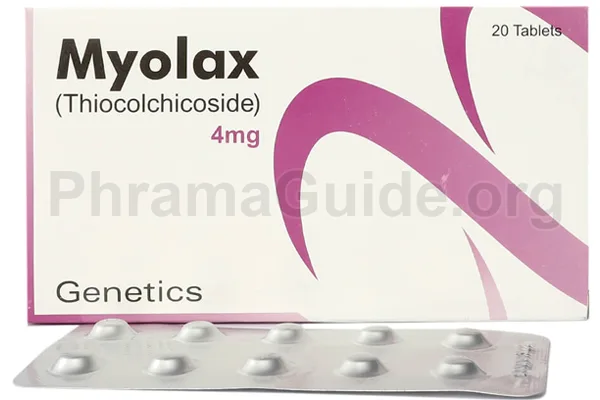Myolax is a muscle relaxant medication used to treat muscle spasms and related conditions. Like any medication, Myolax can have side effects, some of which are common, while others are less common.
Common Side Effects
- Gastrointestinal issues: Nausea, vomiting, and diarrhea are relatively common side effects of Myolax.
- Drowsiness or dizziness: Many people may experience drowsiness or dizziness while taking Muolax, which can impair concentration and coordination.
- Fatigue: Feeling tired or lethargic is a common side effect of Myolax.
- Dry mouth: Some individuals may experience a dry sensation in the mouth with Myolax.
Less Common Side Effects
- Allergic reactions: While rare, some people may develop an allergic reaction to Myolax, characterized by symptoms like itching, rash, hives, swelling, and difficulty breathing.
- Headache: Headaches may occur in some users.
- Hypotension: A drop in blood pressure, leading to symptoms like lightheadedness or fainting, can be a less common side effect.
- Skin reactions: Less common side effects of Myolax may include skin rashes or itching.
- Liver function abnormalities: In rare cases, Myolax may cause changes in liver function, leading to symptoms like jaundice (yellowing of the skin and eyes), dark urine, or abdominal pain.

What is Myolax?
Myolax is one of the leading brands of Thiocolchicoside, manufactured and marketed by Genetics Pharmaceuticals, Pakistan.
Myolax : Available Formulations and Strengths
Presently, Myolax is available in Tablet and Injection Forms
Myolax Tablet : 4mg strength
Myolax Injection : 4mg/2ml strength
What Are The Possible Drug Interactions of Myolax?
- Sedative Medications: Myolax can enhance the sedative effects of other drugs, such as benzodiazepines (e.g., diazepam), opioids (e.g., codeine), and certain sleep aids. Combining these medications can lead to increased drowsiness, dizziness, and impaired coordination.
- Alcohol: Concurrent use of alcohol with Myolax can intensify drowsiness and dizziness. It’s important to avoid alcohol while taking this medication.
- Other Muscle Relaxants: Combining Myolax with other muscle relaxants can lead to an additive effect and an increased risk of sedation and muscle weakness.
- CNS Depressants: Medications that depress the central nervous system (CNS), such as antipsychotics, antihistamines, and certain anticonvulsants, can interact with Myolax, intensifying the sedative and dizziness-inducing effects.
- Anticoagulants: There have been reports of increased bleeding when Myolax is used in combination with anticoagulant drugs like warfarin. It’s essential for healthcare providers to monitor your clotting times if these medications are used together.
- Antihypertensive Medications: Myolax may cause a drop in blood pressure, so combining it with antihypertensive medications can further reduce blood pressure, potentially leading to hypotension. Close monitoring and dosage adjustments may be necessary.
- Oral Contraceptives: Some studies have suggested that Myolax may reduce the effectiveness of oral contraceptives. It’s advisable to use alternative forms of contraception while taking Myolax if you are concerned about this interaction.
- Lithium: Myolax may increase lithium levels in the blood, potentially leading to lithium toxicity. If you are taking lithium for a mood disorder, your healthcare provider will need to monitor your lithium levels closely.

Leave A Comment